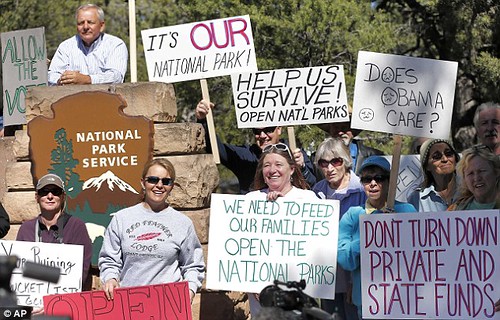Quote of the day: Federal Government Shutdown
From the Guardian column "With government shutdown, Republicans reap what they sow":
During previous shutdowns, calm heads ultimately prevailed: people who cared about good government, or at least worried about the polls that pointed to widespread public disgust. But this is now Donald Trump’s Washington and there are no calm heads to be found.During previous shutdowns, calm heads ultimately prevailed: people who cared about good government, or at least worried about the polls that pointed to widespread public disgust. But this is now Donald Trump’s Washington and there are no calm heads to be found.====
In any case, it seems unbelievable that Congress is incapable of doing one of the only things they are mandated to do, which is to pass an annual budget for government operations.
Still, while I concede the idea of a "swamp" as it relates to lobbying, especially in favor of the interests of capital, the reality is that "Washington" isn't created in or by "Washington" but by the electoral choices they make when voting who to represent them in their House Districts and as their state's Senators.
DC government. Because DC is a federal district, local government gets mixed up in the crosshairs of shutdown. With the last shutdown, DC carved out its locally-generated monies and made the argument that spending local monies shouldn't be held hostage to the federal budget, and it continued to operate and function. Mayor Bowser is taking the same course this time ("'DC is open' If Federal Government Shuts Down, Mayor Says," NBC4).
DC also plans to step in and maintain NPS properties that will go unmaintained during the shutdown. From the article:
If the government shuts down, crews with the D.C. Department of Public Works (DPW) will pick up trash from 126 federal properties in the city, including the National Mall, Pennsylvania Avenue and Dupont Circle. If it snows, the same crews will clear roads the National Park Service usually would clear.Federal shutdowns and national parks. In the past I've written about the impact of the shutdown of national parks on local economies, but this time, Republicans aimed to allow parks to be open to the public but without staff ("What Does the Government Shutdown Mean for National Parks and Park Visitors?," National Parks Conservation Association). T
"People from across the nation and around the world come to visit our nation's capitol, and we take great pride in our city and want to ensure it looks clean and its best, regardless of what's happening at the federal level," DPW director Christopher Shorter said.
The work will cost an estimated $100,000 per week. D.C. could request reimbursement from the federal government for costs incurred during the shutdown, or could include these costs in federal payment budget requests.
hey're doing this because parks shutdowns seemed to generate the most negative reaction on the part of communities and the electorate (along with cutbacks of TSA personnel at airports).
According to the US Travel Association ("Shutdown Would Cost U.S. Travel Economy At Least $185M per Day"), a federal government shutdown would cost the U.S. travel sector at least $185 million per day in economic output due to lost activity and affect 530,000 travel-related jobs due to temporary layoffs, reduced wages and fewer hours worked.

Protest: Locals complain about the Grand Canyon National Park closure which is costing the community in lost tourism. Image via the Daily Mail.
In those parts of the country with federal parks and public lands that are key elements of local tourism, there are more specific and hard felt effects on local economies from shutdowns.
This is why for some time I have argued that local and state parks and tourism planning needs to include contingency planning for federal shutdowns, and state and federal budget cutbacks ("Federal shutdown as another example of why local jurisdictions should have more robust contingency and master planning processes" and "Contingency planning in parks planning: Montgomery County Maryland edition").
According to the NPS report Effects of the October 2013 Government Shutdown on National Park Service Visitor Spending in Gateway Communities:
• A 7.88 million decline in overall NPS October visitation resulting in a loss of $414 million NPS visitor spending within gateway communities across the country;
• Gateway communities near forty five parks experienced a loss of more than $2 million in NPS related October visitor spending;
• Five states experienced a decline of over $20 million in NPS October visitor spending;
• Each dollar of funding for the 14 parks opened with state funding before the end of the shutdown generated an estimated $10 in visitor spending.
But it's best to plan ahead and have those agreements in place before a shutdown, not once a shutdown is underway. Which is what DC is doing in terms of committing to providing trash pick up and snow clearance.
Labels: electoral politics, governance, government operations, provision of public services, tourism


0 Comments:
Post a Comment
<< Home